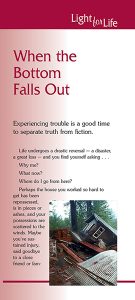
Experiencing trouble is a good time to separate truth from fiction.
Life undergoes a drastic reversal — a disaster, a great loss — and you find yourself asking . . .
Why me?
What now?
Where do I go from here?
Perhaps the house you worked so hard to get has been repossessed, is in pieces or ashes, and your possessions are scattered to the winds. Maybe you’ve sustained injury, said goodbye
to a close friend or family member through death, or lost your job and financial security. You’re wondering what will happen now that the bottom has fallen out of life.
Many answers may come to our troubled minds in times like these. But are they good answers? The rough places in life call for tough truth — biblical truth that gives hope and exposes fiction.
The six boldfaced statements that follow are somebody’s version of “truth.” You have probably heard them stated by well-meaning people. We follow each statement with another take, in light of Christian Scripture.
This disaster came as punishment from God.
Probably fiction. The Bible does talk about God forming light and creating darkness, making peace and creating evil (Isaiah 45:7). This includes pain and suffering. By not removing evil from the world and by giving humans the option of choosing evil for themselves, God is, at least indirectly, responsible for both natural disasters and human troubles that befall us.
But God doesn’t often match up natural tragedy with our personal sins on a one-to-one basis. Even natural elements, which He created exclusively good (Genesis 1), have the potential for evil and can bring suffering to many without regard to faith or conduct. Think tsunami.
While setbacks and sorrows can result from our poor choices or from the poor choices of others, many of life’s storms fall randomly on all kinds of people. The Bible character Job, for example, lived rightly in the eyes of God and still experienced the worst of calamity: the loss of his livestock, servants, children, and health (Job 1:13-22; 2:7).
No, disaster is not usually a punishment for sin.
You should give thanks for all things; everything that happens is good.
Fiction. Neither half of this statement is correct, although both parts come close to Bible words. Scripture says we should give thanks “in” everything, not “for” everything. The reason, obviously, is that not everything that happens in this life is good. Many bad things take place every day, and we certainly don’t give thanks for them. However, we can give thanks in the midst of problems and disasters because God works in all circumstances to bring about something good for His people (Romans 8:28).
Trouble is no good reason for thanksgiving. A God who turns trouble to triumph is!
God won’t give you a burden greater than you can bear.
Fiction. Read closely: The worst of life’s hardships were intended to be more than you can bear — alone.
God knows our weakness and He knows our limits. He does promise that He will never give us more burdens than we can carry with Him (Matthew 11:28-30). Without God, any burden may be unbearable. We need His strength to endure it all.
God is always with His people, walking with them through the dark passages of life: sorrow, despair, depression, anxiety, gloom, physical or emotional pain. He promises that no matter how deep the waters of tragedy or how hot the fires of suffering, He will not let us drown or be burned (Isaiah 43:2). God bears our burdens daily (Psalm 68:19). But in order for Him to do so, we must cast the whole load on Him and refuse to carry it ourselves. The Bible says, “Cast all your anxiety on him because he cares for you” (1 Peter 5:7; see also Psalm 55:22).
Paul, a diehard missionary for Christ, wrote about his experiences. He described being “under great pressure, far beyond our ability to endure, so that we despaired even of life”
(2 Corinthians 1:8). Paul knew the reason he faced such trials was so that he wouldn’t trust in himself but in God (v. 9).
Being a Christian protects you from suffering.
Fiction. It is a common misconception that Christians are promised smooth sailing for life: good health, solid home, loving marriage, obedient children, and plenty of money in the bank. But any earnest believer will tell you how false this impression is.
Jim Elliott turned his life over to Jesus at an early age. After Christian college, he decided to become a missionary to Ecuador. In January 1956 Elliott and four other men devoted to Christ were martyred by the Auca Indians in the jungles of Ecuador.
A more recent example is the Christian students who were murdered at Denver’s Columbine High School in April 1999. They had been involved in youth groups and had talked of their faith with others. But their faith didn’t protect them from the deadly gunfire of two classmates.
Jesus, the realist, said that the world is full of trouble, and He assured His disciples that they would certainly encounter it. But He added, “Take heart! I have overcome the world” (John 16:33). Christians will suffer, but God grants them the courage to persevere.
Good comes out of bad.
Truth — a promise, in fact, for those who are believers in Jesus Christ (Romans 8:28). This verse says that God is the mastermind working behind the scenes, fitting all things together for ultimately good results. With Him nothing is haphazard or by chance. Even before we were born, God determined good purposes for us as His children (Psalm 139:16). The Bible assures us that God knows what plans He has for us — plans for a future and a hope (Jeremiah 29:11).
God sees everything — not just our present pain, but our past and future as well. Though we cannot see it now, He has a design in mind to work the negative for positive results in His time and way. Helen Keller, for example, became deaf and blind when she was 19 months old. She struggled to overcome almost impossible odds through physical and emotional stress. But Helen became one of the world’s most admired women for her work among the blind and disabled.
Have you heard the saying “God has a wonderful plan for your life”? A realistic Christian revised it this way: “God has a plan for your life. It has a wonderful end, but it may not always seem so wonderful along the way.”
Tomorrow will be better.
Truth or fiction. People may say, “Everything will be OK,” but in reality, tomorrow could be worse in this uncertain world. Today’s rebuilding and regrouping can be lost again.
If that happens, a golden tomorrow still awaits those who hope in Christ — a tomorrow that will be infinitely better than today. This world is not our final home. If we’ve come to know Jesus Christ and trust His sacrifice for our sins, we’ll live in an eternity free from death and destruction and pain and suffering. Paul even said that the sufferings we endure on earth can’t compare to the good things awaiting us for eternity (Romans 8:18).
Whatever the challenge or loss you face today, God knows about it and cares. Trust and obey Him through Christ, and the eventual victory — the eternal Home — is sure!
Scripture quotations were taken from the New International Version.
